2018 Sports PR Summit Recap
May 28, 2018
Written by Montclair State University students and Madeline Breskin:
All photos shot by Brad Kinzer, Kinzer Images and Sports PR Summit photographer
Tuesday, May 22, marked the sixth edition of the Sports PR Summit. Held at The Players’ Tribune’s New York offices, public relations and social media professionals from across the sports world, gathered to hear stories from fellow communicators, athletes and journalists on the latest industry trends and PR best practices.
After a welcome from Sports PR Summit founder Brian Berger, Brian Poliakoff (Associate Director of Communications, Twitter) moderated the day’s first panel on “Handling a Crisis on Social Media.”
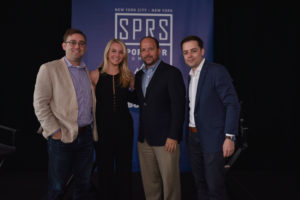
Panelists Matthew Hiltzik (President & CEO, Hiltzik Strategies), Marissa O’Connor (Director of Social Media Strategy, Arizona Coyotes) and Brooks Thomas (Social Media, Southwest Airlines) discussed how the digital age has evolved crisis management.
The conversation started with a reminder that social media has heightened the need to know your audience and build meaningful connections with consumers before a crisis. Each panelist pointed out that strong consumer relationships and social media engagement in good times helped them mitigate damage during bad times.
When communicating on social media, Thomas reminds his team to “have heart behind it all” and be authentic. He championed the unique ability of social media to improve customer service and strengthen personal connections between companies and consumers.
As the panel addressed keys to successful crisis management, Hiltzik spoke on the importance of taking a step back and assessing the situation, noting that companies can be inherently risk averse, causing them to react disproportionately to situations. “Social media makes things seem like a bigger deal than they are. It’s important to understand if your audience cares,” HIltzik said.
Hitzik also stressed the importance of language and how specific word choices might impact the public in a moment of crisis. “During crises, it is important to understand the language that you need to use. If it takes a crisis to determine what is wrong with the company, then you are already at a disadvantage.”
The panel cautioned against falling into the trap of reacting immediately. “Sometimes people don’t want to hear from you right away,” said Hiltzik. Thomas pointed out that what people remember is the long term result of your action. While holding statements serve a purpose, at times, it’s ok to wait to make broad comment until you can show your actions. The panel’s advice? Assess the situation, formulate an action plan and don’t be afraid to wait for results.
The conversation continued with a reminder on the importance of continually educating executives on social media and the right way to use it. “Education is critical to getting executive buy in during a crisis,” said O’Connor. Her team works to proactively share industry best practices and ideas on an ongoing basis. So when the need to react to a crisis comes, she’s equipped with examples and expectations. At Southwest Airlines, Thomas creates white papers and case studies to share with executives to increase their understanding of PR and social media.
The panel went on to discuss the importance of education and audience experience on social media. “In 2018, you almost don’t have a choice of giving fans that one-to-one experience,” O’Connor said about interacting with fans during a crisis. Thomas said Southwest Airlines goes live for their social media audiences to provide company transparency: “Getting a voice in front of the camera is so important.”
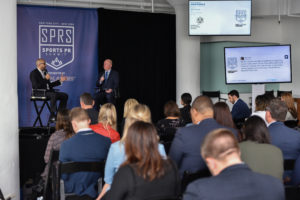
The day’s first featured conversation welcomed New York Knicks Head Coach David Fizdale to the stage for a discussion on “PR, Social Media and Media From the Coaches Perspective” with Sports PR Summit Founder and Sports Business Radio host Brian Berger.
Coach Fizdale spoke about the keys to being a good communicator and having empathy for reporters and PR people….who are doing their jobs when they interact with him.
Fizdale spoke about the importance of building relationships with reporters. Fizdale said, “It’s important to spend time with the media you will be talking with and build relationships in the good times not just the bad.”
For Fizdale, the PR/coach relationship is about finding a balance where he can have a point of view and passion, but not at the expense of the team or himself. He looks to PR people to save him if he’s in a deteriorating situation and to be honest with him about his approach, giving him specific ways that he can improve.
According to Fizdale, PR and Community Relations teams can help guide coaches on how to best be involved in the community by learning about their coach’s history and passions.
Fizdale said it’s important to educate players on hot-button issues as needed. “Through education and discussion, you get closer. As their coach I try to arm them with as much information as I can. I respect them as citizens, not just as an athlete.”
Fizdale monitors social media via his wife’s social media, but said he has no desire to launch his own social media accounts.
The conversation closed with Fizdale’s assessment that the role of a coach is no longer one dimensional. Coaches have a responsibility to be leaders in the community too, while remaining aligned with their team.

For the second featured conversation, Bonnie Bernstein, the founder of Walk Swiftly Productions, hosted a candid discussion with Jemele Hill, senior correspondent at ESPN’s The Undefeated, that touched on managing your personal brand and the value of personal publicists.
Hill spoke about coming to terms with the fact there is little distinction in the public’s mind between her personal opinions and the company she works for. This realization was one reason she looked to bring on a personal publicist. She spoke of the need to serve her own brand in addition to her company’s, noting that publicists can give you an outsider’s opinion and help you recognize opportunities to diversify your brand and have recognition outside of the area you’re currently playing in.
Hill said it’s important for publicists to learn who their clients are as people, their value systems, and how PR can amplify their values and mitigate their sensitivities.
“Whenever there is a crisis, I’ve always written my own statements. It’s important to be genuine,” she said. Hill addressed the delicate balance of using social media to maintain an authentic voice — particularly as that authenticity could be damaging to your company. Hill said the it’s critical to strike a balance between being a real person and serving your company.
Hill sees herself not as an activist but a journalist. “I am not an advocate, but something I advocate for is journalism. We need to bring awareness to important issues.”
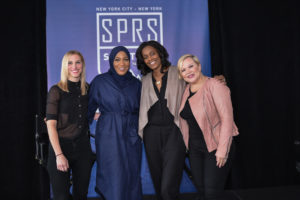
The afternoon session kicked off with The Players’ Tribune Roundtable Discussion, moderated by Holly Rowe (Reporter, ESPN) and including Olympians Swin Cash and Ibtihaj Muhammad, and Jessica Robertson (Head of Content, The Players’ Tribune).
The panel began with an acknowledgement of the need to increase storytelling around women’s sports. Cash spoke of the number of great role models in the WNBA whose stories are never told. She challenged the media to stay curious: “Not only was I playing the game, I was in the trenches for advocating for our support. The WNBA has been ground zero for having a lot of women who are advocates and role models.” For Robertson and The Players’ Tribune, increasing coverage is “about listening and going where the silence is.”
The panelists felt the best chance to build interest in women’s sports and affinity for female athletes is to cover personal stories, building a human connection between athletes and potential fans. Publicists have the opportunity to share these personal stories and educate the media on who these women are off the field of play.
Panelists theorized that more coverage will lead to more acceptance and interest. According to Muhammad, “As an athlete who’s a minority, you have to be exceptional to be accepted.” She notes that brands are starting to realize they need a diverse set of endorsers to successfully reach their consumers.
The panel spoke of this as an opportunity for athletes and also for corporate PR teams. Cash closed the discussion by urging brands, PR teams, and media to “stop being lazy” and work to find stories that are inclusive and representative. “Brands are so concerned with whether or not society is ready for something but need to start making these calls,” Cash said.
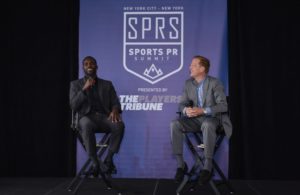
During the final featured conversation, former NFL QB and current Fox Sports analyst Michael Vick spoke with SiriusXM Radio host and Bleacher Report Senior writer Ric Bucher about his personal journey back to the sports world, learning to take advice from PR people and the importance of being authentic and true to yourself in your communication. Vick was reflective and candid and did not shy away from direct questions about his past.
Vick shared that he was reluctant to take advice from PR teams early in his career. He admitted not seeing the value in PR and urged PR teams and publicists to be persistent with trying to educate and advise their young athletes. Vick said as a young athlete, you often don’t want to understand or contemplate the potential ramifications of your actions.
Vick said PR professionals can better help athletes by continuing to push them to listen and by learning an athlete’s interests and what makes them different from their peers.
Vick said athletes can’t be afraid to take PR advice or view change as “selling out.” Vick noted that it is critical to be authentic with your message and how you feel. Vick advocated for being the best version of yourself, not the best version of an athlete in the eyes of a PR professional or the public.
The conversation shifted to Vick’s desire to leave a legacy through the work he’s done in the community. He spoke about not recognizing the importance of being a role model when he joined the NFL and how he gained an appreciation and understanding of this during his time in prison. Vick said, “I wish I would have understood the importance of having a publicist early in my career. It sounds silly but I didn’t want to spend the money. I really needed someone to say ‘listen, you’re blowing it.’ But everyone was too afraid to tell me the truth.”
Vick spoke about understanding that there will always be those who don’t support him or believe he should have a second chance. He doesn’t let this distract or deter him, saying “you just have to be happy with the work you are doing and how you are living.”
Vick said he hopes to remembered as a good player and broadcaster who “really cares about people.”
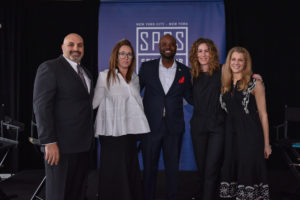
The day concluded with a panel hosted by Bonnie Bernstein on “Navigating PR in the Zero Tolerance Era.” Panelists Jaymee Messler (President, The Players’ Tribune), Keri Potts (Senior PR Director, ESPN), David Cohen (Founder, Major League Business, LLC.) and Ted Crews (VP Communications, Kansas City Chiefs) advised on communicating during the most sensitive crises.
Continuing the sentiment of the Summit’s first discussion, the panel stressed the importance of waiting to gather the facts and avoid feeling like you have to respond right away. Crews noted that while passionate fans are quick to react, PR teams should do their due diligence and assess the situation before making a knee jerk reaction. Crews sees the role of PR professionals in a crisis is to stand in the gap and provide good counsel and advice to one’s team or corporate leaders.
Particularly in the current digital age, PR professionals have to consider strongly the best tools and mediums to release information. Publicists and PR teams need to have a good understanding of where and how to share their message. For Crews, social media presents the biggest change to PR and communication strategy. His team often opts for releasing information on their website and social channels over a traditional press release.
Cohen addressed the need to align messages across any organization to ensure communications consistency, especially among PR and legal teams. He urged PR professionals to build relationships with their legal teams ahead of time so a strong foundation and understanding exists when a crisis hits.
Bringing the discussion home, Messler offered this advice to athletes and publicists dealing with crisis: “Bring humanity and personalization to a situation. People are more forgiving when you open up about what’s really going on.”
###
